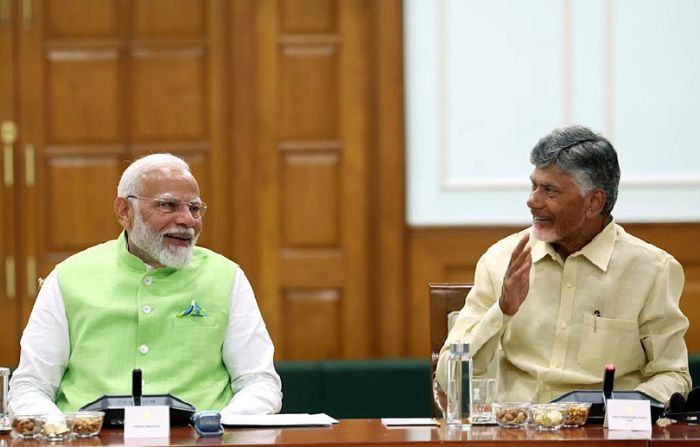- Thursday, April 10, 2025
GMC Balayogi, also a former Speaker from Telugu Desam Party, had played a key role in the fall of the NDA government led by Atal Bihari Vajpayee 25 years ago.

By: Shubham Ghosh
THE new cabinet of prime minister Narendra Modi has taken oath and the new administration has already got into action with the PM signing files and meeting his colleagues in the government. Modi and his Bharatiya Janata Party (BJP) have been found to be busy playing a balancing act with their allies in the National Democratic Alliance (NDA) since the Hindu nationalist party failed to get a majority on its own in the recent general elections and would have to depend on other alliance partners for the survival of its government.
Some of the key allies in the NDA are the Janata Dal-United (JD-U), Telugu Desam Party (TDP) and Rashtriya Lok Dal (RLD), regional parties from the states of Bihar, Andhra Pradesh and Uttar Pradesh, respectively.
But the BJP still has to accomplish a significant task and that is arriving at a consensus with the JD-U and TDP over the key post of the Speaker of the Lok Sabha or the Lower House of the Indian parliament. Modi’s party did not have this challenge in its last two terms in the government since it had any majority of its own and its own parliamentarians — Sumitra Mahajan and Om Birla — carried out the responsibilities between 2014 and 2024.
Read: Third Modi government takes over: Here’s full list of ministers
The role of the Speaker is significant in Indian politics and it has been witnessed in the past.
In 1999, for instance, the coalition government of Atal Bihari Vajpayee, another leader of the BJP, fell after losing a trust motion in the Lok Sabha by a solitary vote despite getting support from several parties. The Speaker of the day had a key role in that event. While it was not the post-holder’s vote that led to the Vajpayee government’s downfall, a crucial decision did.
Read: Coalition era returns in Indian politics: Can Modi do a Vajpayee?
What makes the BJP more apprehensive about giving the post of the Speaker away is the 25-year-old incident it was a leader from the TDP who was in the chair of the Speaker — GMC Balayogi.
It so happened in 1999 that a key ally from the southern state of Tamil Nadu withdrew its support for the Vajpayee government, necessitating a no-confidence motion. And in the voting that ensued on the floor, Balayogi had allowed Giridhar Gamang, an MP of the opposition Indian National Congress who was also the chief minister of the eastern state of Odisha at the time, to cast his vote and it proved to be the game-changing ballot.
While Gamang was still a member of the parliament at the time of the voting despite taking over as the CM, his voting in the parliament brought political ethics in focus.
He later said that his party had asked him to vote which he did.
The final voting on the confidence motion saw the NDA government getting 269 votes while 270 going against it. While the Speaker himself had not voted, his discretionary power caused the government of the day to collapse.
Balayogi was appointed as the Speaker in 1998 on the insistence of Naidu, who was part of the NDA at that time as well.
Vajpayee was re-elected to office later next year and he served for a full term of five years.
According to experts, the TDP boss is eyeing the position to go to his party this time is because he wants to shield himself and his party from any possible split in the future. According to an NDTV report, Naidu wants the Speaker’s post as an ‘insurance’ against Modi’s BJP.
There are in fact reports that the TDP is trying to make Harish Balayogi GM, the son of Balayogi and a first time MP from Andhra Pradesh, the Speaker.
The Speaker’s post is significant in parliamentary politics as he/she controls the legislative process in the Lok Sabha, the land’s highest legislative body. He/she is the presiding officer of the House and wields substantial influence over its functioning.
It is the duty of the Speaker to maintain decorum in the House and he/she can adjourn the proceedings or suspend them in case order can not be maintained. The official is also considered to be the final interpreter of the provisions of the Constitution of the country and the conduct of business of Lok Sabha.
The Speaker also decides on disqualifying a member and is the final authority when it comes to matters of defection.